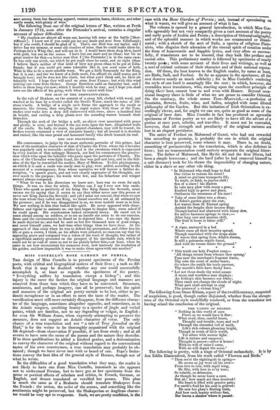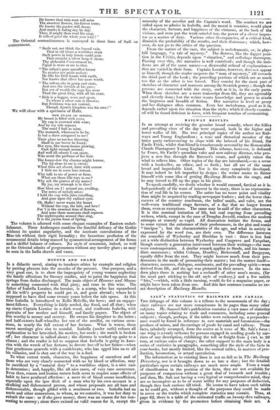MISS COSTELLO ' S ROSE GARDEN OF PERSIA.
THE design of Miss Costello is to present specimens of the Persian poets, with critical and biographical notices of their lives ; a task so dif- ficult that it may be doubted whether any one could successfully accomplish it, at least as regards the specimens of the poetry. "Everything suffers by translation except a bishop" ; and this injury is the surer the farther the original language and manners are removed from those into which they have to be converted. Structure, sentiments, and perhaps imagery, can all be preserved ; but the spirit and manners of the original are pretty certain to be lost, either in pe- dantic metaphrase or in an effort to meet the taste of the reader. The versification must still more certainly disappear, from the different charac- ter of the language, sometimes altogether opposite, and sometimes, as in the Asiatic tongues, ascribing beauty to a species of jingle and verbal points, which are familiar, not to say degrading or vulgar, in English : for even Sir William Jones, when expressly attempting to preserve the measure, does not suggest an Asiatic character of verse. The only chance of a true translation and not "a tale of Troy founded on the Iliad," is for the writer to be thoroughly acquainted with the original life depicted—from observation if possible, if not from study ; and at all events to have seen the scene of the poems and the nature they describe. If to these qualifications be added a kindred genius, and a determination to convey the character of the original without regard to the conventional tastes of his own countrymen, a true translation may probably be ob- tained; though we have never met with or heard of one. Pope's Imita- tions convey the best idea of the general style of Horace, though not of what he wrote.
Be the difficulties of a good translation what they may, the reader is not likely to have one from Miss Costello, inasmuch as she appears not to understand Persian, but to have got at her specimens from the prose or poetical efforts of scholars and critics, in French, German, or English, and thence translated or versified her poems. This plan is much the same as if a Brahmin should translate Shakspere from the French : the action, the order of the scenes, and something like the sentiments might be preserved, but the Shaksperian or Anglican charac- ter would be very apt to evaporate. Such, we are pretty confident, is the case with the Rose Garden of Persia; and, instead of speculating on what it wants, we will give an account of what it has.
The volume is opened by a general introduction, in which Miss Cos- tello agreeably but not very compactly gives a curt account of the poetry and early poets of Arabia and Persia ; a description of Oriental caligraphy, and of the splendid manner in which works are ornamented or illumi- nated ; with a sketch of the sect of Sufis, a species of religious Plato- nists, who disguise their adoration of the eternal spirit of creation under the form of Anacreontic and Sapphic lyrics, and very often so success- fully, if translators are to be trusted, that they look like profane and carnal odes. This preliminary matter is followed by specimens of nearly twenty poets; with some account of their lives and writings, as well as a sort of critical estimate of their character and of their national reputa- tion. Of these, the best known to the English reader, by name at least, are Hafiz, Sadi, and Ferdusi. So far as appears in the specimens, all the rest deserve nearly as much celebrity ; for in Miss Costello's rendering the style of one bard is amazingly like the rest : in which, however, she resembles most translators who, starting upon the excellent principle of doing their best, cannot bear to nod even with Homer. Beyond occa- sional imagery there is little of what we are prone to consider Oriental. On the contrary, the whole seems Tom-Mooreish,—a profusion ot fountains, flowers, fruits, wine, and ladies, mingled with some dilated philosophy of the Garden. But this imitation of Irish Orientalism is ex- ceedingly clever, and, for aught we can see, quite as good as some of the original of later date. Miss Costello in fact has produced as agreeable specimens of Persian poetry as we are likely to have till the advent of a genius at once poet, scholar, and traveller. It must not be concealed, however, that all strength and peculiarity of the original raciness are lost in an elegant prettiness.
The satire of Ferdusi on Mahmoud of Guzni, who had not rewarded him according to promise, is probably the one in which the original character is best preserved, come whence it may. There is, no doubt, something of poetastership in the translation, which is also deficient in force ; but no transmutation could entirely evaporate the original bitter- ness. The father of Mahmoud, like Hyder Ali and the first Sforza, had been a simple horseman ; and the bard (after he had removed himself to a safe distance) took for his theme the impossibility of changing nature, either in a slave or any other vile thing.
"In Mahmoud who shall hope to find
One virtue to redeem his mind? A mind no gen'rous transports fill; To truth, to faith, to justice chill! Son of a slave! his diadem In vain may glow with many a gem; Exalted high in power and place, Outbursts the meanness of his race !
"Take of some bitter tree a shoot; In Eden's garden plant the root.; Let waters from th' Eternal spring Amidst the boughs their incense fling: Though bathed and showered with honey dew,
Its native baseness springs to view;—
After long care and anxious skill, The fruit it bears is bitter still."
"A viper, nurtured in a bed Where roses all their beauties spread, Though nourished with the drops alone Of waves that spring from Allah's throne, Is still a poisonous reptile found, And with its venom taints the ground."
"This truth our holy Prophet sung—
All things return from whence they sprang.' Pass near the merchant's fragrant wares, Thy robe the scent of amber bears; Go where the smith his trade pursues, Thy mantle's folds have dusky hues.
"Let not those deeds thy mind amaze A mean and worthless man displays: An Ethiop's skin becomes not white; Thou canst not change the clouds of night.
What poet shall attempt to sing
The praises of a vicious king?" The following from Omar Khiam, a poet of the twelfth century, suspected of scepticism, is good, though rather disjointed, whether from the abrupt- ness of the Oriental style unskilfully rendered, or from the translator not having seized the conclusion of the original.
THE VANITY OF REGRET.
"Nothing in this world of ours
Flows as we would have it flow: What avail, then, careful hours, Thought and trouble, tears and wo? Through the shrouded veil of earth, Lifer rich colours gleaming bright, Though in truth of little worth, Yet allure with meteor light. Life is torture and suspense; Thought is sorrow—drive it hence! With no will of mine I came, With no will depart the same." The following is pretty, with a tinge of Oriental melancholy. It is by Azz Eddin Elmocadessi, from his work called "Flowers and Birds."
"Thou see'st the nightingale in spring— He seems as joy were all his own—
From tree to tree, with rapid wing, He flits, with love in ev'ry tone; So volatile, so debonaire, As though he never knew a care.
But sit! how much art thou deceived!
His heart is filled with pensive pain;
For earth's frail lot his souls grieved:
He sees her glory's fleeting train, And how each beauty withers fast, Nor leaves a shadow where it passed; He knows that ruin soon will seize The sweetest flowers, the fairest trees; He knows the garden will decay, And marks it fading day by day. Thus, if aright thou read his song, It tells of grief the whole year long ! "
The Oriental sententiousness is conveyed in these lines of Sadi on
contentment.
"Smile not, nor think the legend vain,
That in old times a worthless stone Such power in holy hands could gain That straight a silver heap it shone. Thy alchemist Contentment be, Equal is stone or ore to thee.
"The infant's pure unruffled breast No avarice nor pride molest:
He fills his little hands with earth,
Nor knows that silver has more worth.
"The sultan sits in pomp and state, And sees the dervish at his gate; But yet of wealth the sage has more Than the great king, with all his store.
"Rich is a beggar, worn and spent, To whom a silver coin is thrown; But Feridoun was not content, Though Ajum's kingdom was his own!" We will close with a specimen of Haflz.
THE FEAST OF SPRING.
My breast is filled with roses, My cup is crowned with wine; And by my side reposes The maid I hail as mine.
The monarch, wheresoe'er he be, Is but a slave compared to me !
Their glare no torches throwing Shall in our bower be found; Her eyes, like moon-beams glowing, Cast light enough around; And well all odours lean spare, Who scent the perfume of her hair.
The honey-dew thy charms might borrow, Thy lip alone to me is sweet; When thou art absent, faint with sorrow I hide me in some lone retreat.
Why talk to me of power or fame, What are those idle toys to me ?
Why ask the praises of my name? My joy, my triumph is in thee!
How blest am I! around me, swelling, The notes of melody arise; I hold the cup with juice excelling, And gaze upon thy radiant eyes.
Oh, Ilafiz ! never waste thy hours
Without the cup, the lute, and love! For 't is the sweetest time of flowers, And none these moments shall reprove. The nightingales around thee sing, It is the joyous feast of Spring.
The volume is adorned with some elegant examples of Eastern embel- lishment. These Arabesques combine the fanciful delicacy of the Gothic without its quaint angularity, and the intricate convolutions of the Moo ish without their rigid formality; the luxurious profusion of the ornamental details being massed by symmetrical arrangement of the forms and a skilful balance of colours. No style of ornament, indeed, so well as the Oriental admits of gorgeousness without any tawdry glare ; as may be seen in the India shawls and vases.



























 Previous page
Previous page